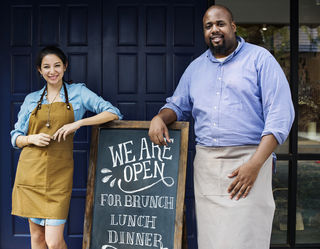Marriage
Consensual Non-Monogamy: What Is This New Label?
Reducing the stigma on people in open relationships.
Posted July 22, 2019 Reviewed by Lybi Ma
During a recent podcast, I interviewed David Singer, a licensed marriage and family therapist, and a poly- and kink-aware professional who practices in Los Angeles, California. He specializes in working with people practicing or exploring consensual non-monogamy, those involved in kink and power-exchange relationships, and professional sex workers.
Singer has a master’s degree in clinical psychology with an emphasis on marriage and family therapy. He also has more than a decade of experience working with police and fire departments to help survivors of trauma.
Our interview focused on consensual non-monogamy, as well as the kink lifestyle, and what all of this means.

Here is an excerpt from the interview:
I understand you are not just a kink aware professional, but you also are active in the lifestyle, which gives you greater empathy for the challenges facing this population.
David Singer (DS): Correct. For a long time, I provided this type of service in my practice but more on the DL. It was a slow process before I eventually said, “I’m actually part of this lifestyle.” I was a little worried about how people would react, but it’s been pretty positive.
Positive from other therapists, too?
DS: Yes. That one surprised me, especially over the last couple of years when I have really tried to claim this niche of LA King Shrink. LAKinkshrink.com.
You instantly became safe because you’ve come out, and you’ve created safety for others to come out?
DS: I hope so. It's really impossible, I think, in good conscience, to be in a room with a client and talk about accepting yourself, and loving yourself, while you are at the same time not doing it yourself.
Now, let’s talk about what you call consensual non-monogamy. What does it mean when you say consensual non-monogamy?
DS: It's the idea of being either sexual, or sexual and romantic, or romantic, with more than one person. And you can do that with honor, integrity and transparency. Nowadays people talk about polyamory, the idea of being in multiple relationships. That's one type of consensual non-monogamy. You’ve also heard the term monogamish. That kind of counts as a consensual non-monogamy. Or, it’s like a hall pass. In some relationships, when the partner travels on business, for example, you can do what you want to do as long as there is communication and there’s honesty. it's not cheating.
I also think that can include consensual monogamy. When I ask my couples if they are monogamous, I also ask them if they have negotiated monogamy. For example, can they flirt on Facebook? Can they send private photos? Can they go online with someone in Romania and have web sex? One partner may say no, but the other may say maybe. You realize they have an implicit contract but not an explicit contract. So, isn't it the same thing?
DS: I’m glad you asked that question because a lot of therapists don't ask. Asking the question opens the door to being able to talk about it. And I love, like you said, consensual monogamy. I'm not against monogamy. I do think it's become this automatic default that people get into because they don't think they have any other choice. My experience has been, there's no binary. I think some people are wired monogamous, and there's nothing wrong with it. But explore it, make your choices consciously.
And just like those in open relationships have to renegotiate their contracts, so do those in monogamous relationships. I think monogamous couples think monogamy is going to do the work.
DS: And you end up in this conflict that you didn't anticipate because you didn't really talk about what monogamy means to you.
So, you’re the kinky therapist? What’s the difference between kinky and vanilla?
DS: I think, in general, vanilla is the opposite of kink. We come home after work, we watch a movie, we have missionary sex, and we go to sleep. That's kind of the quintessential vanilla. I doubt if many people are as vanilla as we think they are.
What would make somebody kinky and not vanilla?
DS: Anyone who is exploring is a little bit kinky. It's just this label; and is this label really necessary? So, a monogamous couple occasionally has sex with someone else together. So, they were occasionally kinky. Or occasionally, they like the idea of a blindfold. That's kinky. Does that mean that you're a kinkster? No. It just means that no one really is all that vanilla.
Have you worked with couples where one is kinky and one isn't?
DS: Yes. I have had couples where one wants to be non-monogamous and one doesn't. One of the partners discovers this concept of consensual non-monogamy. And they feel this is what they have always wanted, while the other partner is thinking how hard this is. It takes a lot of work. I do a lot of praising for the partner who doesn’t want to be consensually non-monogamous or is very threatened by it and really confused by it. That's one of the hardest things – working with clients on negotiating that. It comes down to easing fears and defining and educating.
Before we conclude, is there anything else you would like to add?
DS: I think people still think consensual non-monogamous relationships are a really weird, rare thing. About 20 percent of Americans say that, in some point in their life, they’ve had a consensually non-monogamous relationship. And the reputable peer-reviewed research finds 4 percent to 5 percent of the population currently is involved in a consensually non-monogamous relationship. A lot of people are losing their children in custody battles because they're consensually non-monogamous and the ex-partner makes the case in court that they're cheaters.
If you would like to hear the entire podcast, you can find it at www.SmartSexSmartLove.com
To learn more about David Singer, visit his website: LAKinkShrink.com or email him at Lakinkshrink@gmail.com.
References
To learn more about David Singer, visit his website: LAKinkShrink.com or email him at Lakinkshrink@gmail.com.
If you would like to hear the entire podcast you can find it at www.SmartSexSmartLove.com




